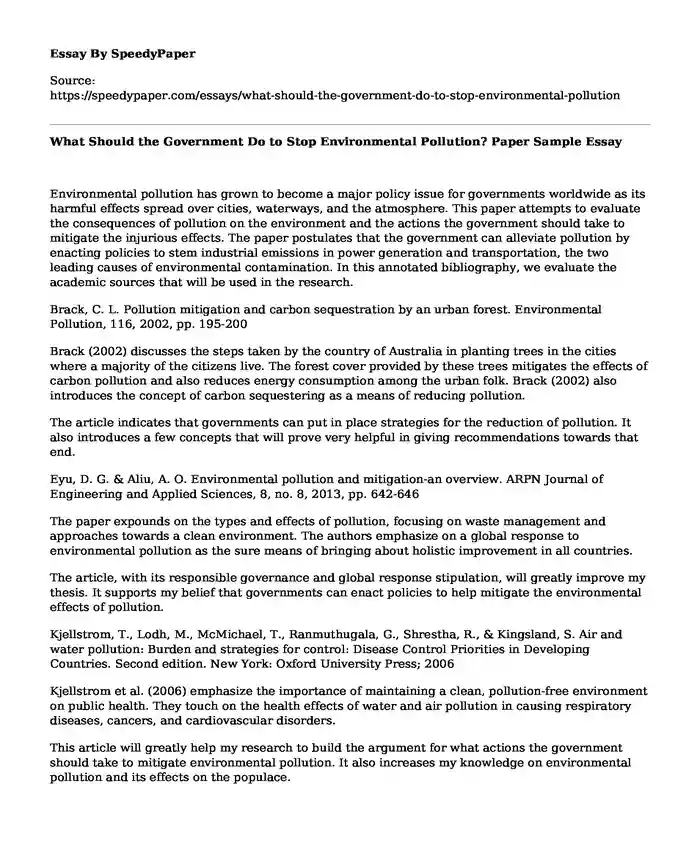Environmental pollution has grown to become a major policy issue for governments worldwide as its harmful effects spread over cities, waterways, and the atmosphere. This paper attempts to evaluate the consequences of pollution on the environment and the actions the government should take to mitigate the injurious effects. The paper postulates that the government can alleviate pollution by enacting policies to stem industrial emissions in power generation and transportation, the two leading causes of environmental contamination. In this annotated bibliography, we evaluate the academic sources that will be used in the research.
Brack, C. L. Pollution mitigation and carbon sequestration by an urban forest. Environmental Pollution, 116, 2002, pp. 195-200
Brack (2002) discusses the steps taken by the country of Australia in planting trees in the cities where a majority of the citizens live. The forest cover provided by these trees mitigates the effects of carbon pollution and also reduces energy consumption among the urban folk. Brack (2002) also introduces the concept of carbon sequestering as a means of reducing pollution.
The article indicates that governments can put in place strategies for the reduction of pollution. It also introduces a few concepts that will prove very helpful in giving recommendations towards that end.
Eyu, D. G. & Aliu, A. O. Environmental pollution and mitigation-an overview. ARPN Journal of Engineering and Applied Sciences, 8, no. 8, 2013, pp. 642-646
The paper expounds on the types and effects of pollution, focusing on waste management and approaches towards a clean environment. The authors emphasize on a global response to environmental pollution as the sure means of bringing about holistic improvement in all countries.
The article, with its responsible governance and global response stipulation, will greatly improve my thesis. It supports my belief that governments can enact policies to help mitigate the environmental effects of pollution.
Kjellstrom, T., Lodh, M., McMichael, T., Ranmuthugala, G., Shrestha, R., & Kingsland, S. Air and water pollution: Burden and strategies for control: Disease Control Priorities in Developing Countries. Second edition. New York: Oxford University Press; 2006
Kjellstrom et al. (2006) emphasize the importance of maintaining a clean, pollution-free environment on public health. They touch on the health effects of water and air pollution in causing respiratory diseases, cancers, and cardiovascular disorders.
This article will greatly help my research to build the argument for what actions the government should take to mitigate environmental pollution. It also increases my knowledge on environmental pollution and its effects on the populace.
Ogunola, O. S. Current advances in strategies to mitigate the impacts of Micro/Nano plastics: A review. Journal of Environmental & Analytical Toxicology, 7, no. 3, 2017, pp. 1-4, DOI: 10.4172/2161-0525.1000447
The article discusses the harmful effects of indiscriminate disposal of plastics to the environment, the outcomes of which have been felt from the North Pole to the South Pole. Ogunola (2017) suggests a societal behavioral change as the ultimate solution to plastic pollution, augmenting the efforts of various stakeholders and strategies already in place.
The article contributes valuable data to the research on the strategies that are already in place, how effective they were, and what can be done to improve their efficiency. The recommendation given in the paper will also be investigated further in my research.
In conclusion, these articles have contributed to the current understanding of the topic and supported my hypothesis on government involvement in environmental pollution mitigation. In my search for sources on which to base my research, I hoped for the kind of informative material evaluated here. While the sources give varied recommendations to mitigate environmental pollution, they fail to address in detail the policies that governments (legislature, executive, and judiciary) can enact to come up effective responses to pollution.
Works Cited
Brack, C. L. Pollution mitigation and carbon sequestration by an urban forest. Environmental Pollution, 116, 2002, pp. 195-200
Eyu, D. G. & Aliu, A. O. Environmental pollution and mitigation-an overview. ARPN Journal of Engineering and Applied Sciences, 8, no. 8, 2013, pp. 642-646
Kjellstrom, T., Lodh, M., McMichael, T., Ranmuthugala, G., Shrestha, R., & Kingsland, S. Air and water pollution: Burden and strategies for control: Disease Control Priorities in Developing Countries. Second edition. New York: Oxford University Press; 2006
Ogunola, O. S. Current advances in strategies to mitigate the impacts of Micro/Nano plastics: A review. Journal of Environmental & Analytical Toxicology, 7, no. 3, 2017, pp. 1-4, DOI: 10.4172/2161-0525.1000447
Cite this page
What Should the Government Do to Stop Environmental Pollution? Paper Sample. (2022, May 02). Retrieved from https://speedypaper.net/essays/what-should-the-government-do-to-stop-environmental-pollution
Request Removal
If you are the original author of this essay and no longer wish to have it published on the SpeedyPaper website, please click below to request its removal:
- Free Essay on Disadvantages of Taking Online Classes
- Free Essay Sample on Toxic Environment
- Essay Sample about Living in Different Cultural Diversities in the World
- Should Californias Three Strikes Law Be Repealed?
- Essay Sample Describing the World Bank Development Activities and Progress in Brazil
- Essay Sample on Research Paper Writing
- Essay Sample on the Economic Environment of Business
Popular categories





